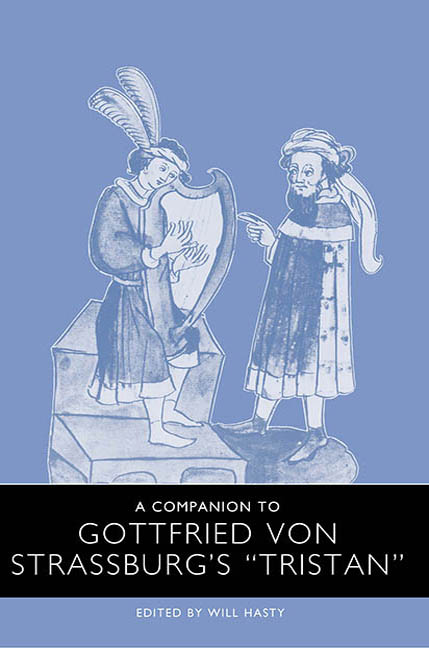Introduction: The Challenge of Gottfried's Tristan
Published online by Cambridge University Press: 28 April 2017
Summary
Whether it is considered a myth that gives new expression to something fundamentally human (Wolf 1), the story of a passion stronger than life, social relations, and self which separates the magical East from the tragic West (de Rougemont 1956, 66–67), or “merely” the great ancestor and prototype of later literary depictions of passionate love as an individual experience at odds with social expectations (Wehrli 271), the emergence of the story about Tristan and Isolde in written form in the twelfth century was a signal development. Perhaps more than any other work or group of works in the flowering vernacular literatures of the time, this tale of adulterous love seems to have provided the possibility to test the limits of human love, along with religious and moral boundaries, with heroes and narrative events the likes of which had not been seen before in medieval literature (and perhaps not in any literature). These heroes and their actions set new standards, or points of reference, that were discussed, advocated or rejected according the predilections and preferences of different poets and audiences. Outside the handful of romances about Tristan and Isolde that have come down to us from the twelfth and early thirteenth centuries, this singular story of passionate adulterous love seems to be everywhere in high medieval literature. The story is a point of reference for lyric poets in Provence, France, and Germany who are interested in ideal love (see Wolf 8–18), but it is also expressive of a life given over to the emotions, which other poets believed needed to be qualified, criticized, or rejected. Both in the different ways that the story was told in the Tristan romances proper, and in the variety of positions taken to the Tristan material by other poets, we observe a narrative that was in the forefront of literary and cultural developments, a story that explored the range and possibilities of human love in this earthly life.
- Type
- Chapter
- Information
- A Companion to Gottfried von Strassburg's Tristan , pp. 1 - 20Publisher: Boydell & BrewerPrint publication year: 2003



